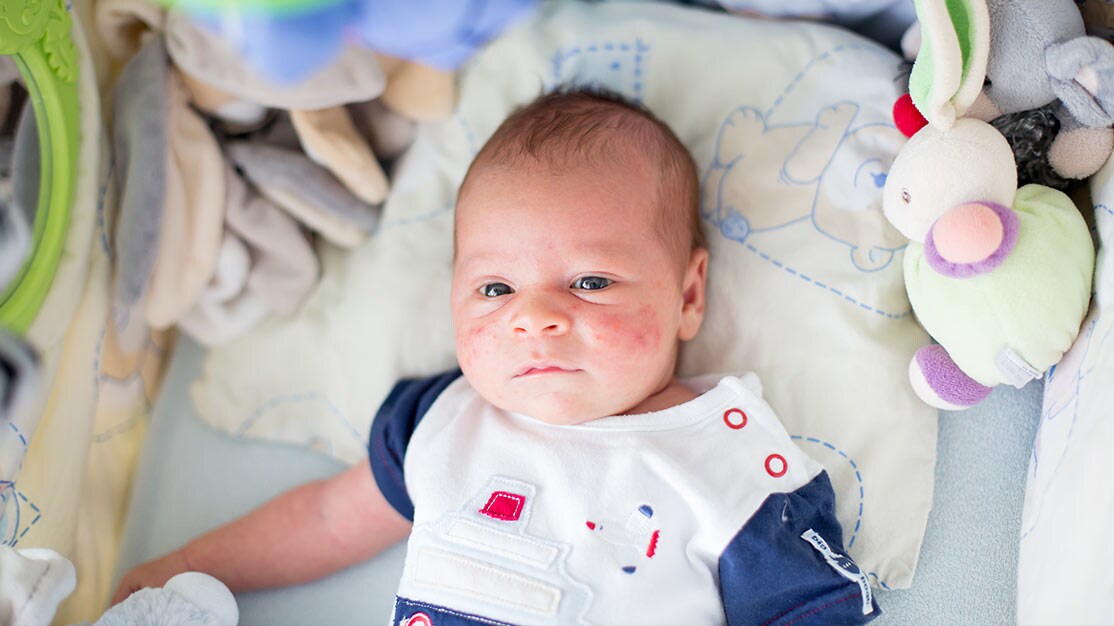Eczema on the face: Causes and treatments

The term "eczema" refers to a group of conditions that cause skin to become dry, inflamed and itchy.
Atopic dermatitis is the most common form of eczema. It mostly affects children, though it can also occur in adults. Eczema presents as red, dry, scaly, and inflamed patches of skin that may itch, ooze or be crusty. If you scratch the affected skin, it can get thicker, darker or become infected.
Eczema can affect any part of the body, including the face. In babies and toddlers, eczema often appears on the cheeks and chin. Adults can also have eczema on the face, such as on the eyelids, for instance. Most of the time, eczema on the face responds well to treatment. Get the details on what causes eczema and how to manage it here.
What causes eczema?
The cause of eczema is still being investigated, but it appears to be triggered by both genetic and environmental factors. In eczema, the immune system reacts to a trigger, specifically to an allergen or irritant outside the body, which sets off a response. This causes symptoms of eczema on your skin. Symptoms tend to come and go over time. When you have active signs of eczema, it's called a flare-up.
How is eczema treated?
If you have red patches, small bumps, dry spots or other symptoms of eczema on your face, see a dermatologist (skin care doctor). While there is no known cure for eczema at this time, there are ways to manage the condition. The goals of treatment are to help ease symptoms, decrease the risk of flare-ups and prevent infections. Treatment involves avoiding eczema triggers, having a good skincare routine, and using medication.
Avoiding triggers
The first line of defense is knowing what causes your eczema to worsen and then avoiding exposure to those triggers. Common eczema triggers include:
- Low humidity as eczema is often worse during the winter months when the air is drier
- Dry skin
- Bathing too often without moisturizing
- Heat and sweating
- Irritants, such as itchy fabrics and harsh soaps and detergents
- Allergens, such as pollen, dust or pet dander
- Infections
- Emotional stress and anxiety
Keep in mind that specific triggers may be unique to you. What causes your eczema to get worse may not bother another person with eczema.
Having a good skincare routine
Washing and moisturizing your skin each day can help control eczema. People with eczema have an imbalance in the top layer of skin, which causes dry skin. Cleansing and moisturizing regularly can help trap moisture in the skin and reduce the frequency of flare-ups.
Cleanse your skin with a gentle face wash. Do not use soap because it can irritate your skin. Use cool water rather than hot water so you don't dry out your skin. After you wash your face, gently pat your skin dry with a towel, and then hydrate your skin with a fragrance- and preservative-free cream or ointment. Do not use lotions because they have a high-water content and evaporate quickly, which can make dry skin worse. Apply the moisturizer at least twice a day, and put it on right after washing your face. Some studies show that moisturizers containing glycyrrhetinic acid, urea, glycerol or oats work better than other ingredients for eczema. Your pharmacist can recommend an eczema face wash, cream or ointment.
It's also important to avoid itching or rubbing affected skin. Scratching can break the skin, which can make eczema worse and may lead to infection. Use these tips to help keep babies and children with eczema from itching their skin:
- Keep nails short. Trim your child's nails often so they cannot break their skin when they scratch. Make checking their nails for sharpness a regular part of your routine, such as during bath time.
- Use eczema mittens or eczema sleeves. If your baby tries to scratch their skin, the mittens can keep them from causing damage.
- Cover itchy skin. If your child has eczema on another part of their body, cover the exposed skin with loose-fitting clothing made of natural fibers, such as cotton, silk or bamboo. Kids may be less likely to itch their skin when it's covered with clothing.
Using medications
Over-the-counter and prescription medications are available to help treat eczema. Topical medications can ease itching, dryness, redness and rashes on the affected areas of your skin. Corticosteroids are often the first medication that's used for eczema, but these medicines can irritate facial skin in some cases and shouldn't be used in sensitive areas, including around the eyes. Instead, your health care provider may recommend using topical calcineurin inhibitors for eczema on the face. These medications work by blocking chemicals that cause eczema to flare up. They can be used on your face, including on the eyelids, neck and skin folds. If topical treatments don't improve your symptoms or if you have more severe eczema, your health care provider may suggest other treatments.
While eczema on the face can be bothersome and unsightly, know that it often responds well to lifestyle changes, good skin care and medications. If you have eczema on your face and want treatment, consider seeing a dermatologist. Together, you can find the best plan to control your eczema.
Published on April 30, 2020
Sources:
"Treatment of atopic dermatitis (eczema)," UpToDate. Web. 28 Jan 2020. https://www.uptodate.com/contents/treatment-of-atopic-dermatitis-eczema?topicRef=1727&source=see_link
"Overview of dermatitis (eczema)," UpToDate. Web. 28 Jan 2020. https://www.uptodate.com/contents/overview-of-dermatitis-eczema
"Eczema treatment," National Eczema Association. Web. 28 Jan 2020. https://nationaleczema.org/eczema/treatment/
"What is eczema?" National Eczema Association. Web. 28 Jan 2020. https://nationaleczema.org/eczema/
"Understanding your child’s eczema," National Eczema Association. Web. 28 Jan 2020. https://nationaleczema.org/eczema/children/
"Facial eczema: how to manage eczema on the face," WebMD. Web. 28 Jan 2020. https://www.webmd.com/skin-problems-and-treatments/eczema/eczema-face-manage
"Itch relief: what can relieve itchy eczema?" American Academy of Dermatology Association. 28 Feb 2020. https://www.aad.org/public/diseases/eczema/childhood/itch-relief/home-remedies